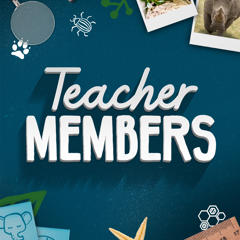Digital programs
Free and interactive online workshops that connect your students with animals.
You and your students are invited to join free 30-minute online workshops. Supporting the VELYDF and Victorian Curriculum, Zoos Victoria's digital programs are available to all schools and early childhood services.
While not a tour of the zoo, these workshops give you direct access to a Zoo Teacher and unique content. Each workshop is hosted on Microsoft Teams Webinars. You will not need a webcam or microphone, and you can type your questions into the chat.
When you join a digital program, you consent to it being recorded. We take privacy seriosuly - only the Zoo Educator will be visible, with all participant details removed.
Get out your calendar
The dates for 2026 are:
- Wednesday 18 February
- Wednesday 6 May
- Wednesday 29 July
- Thursday 10 September (VCE Biology Unit 4 only)
- Wednesday 14 October
Choose your program
Digital program workshops will have the same format and content each time. Each teaching guide includes curriculum links and classroom activities.
Select your preferred program to find out more:
| Time | Program |
|
10.00 - 10.30am
|
|
|
10.45 - 11.15am |
|
|
11.30am - 12.00pm |
|
|
Not offered in Term 1 |
|
|
Not offered in Term 1 |
Explore nature and Aboriginal connections to Country through play, storytelling and song.
Children will learn:
- Australian animal coverings and body features
-
People’s connection to place and nature
-
How to use the senses to find out about science
-
How to respect and care for animals
Teaching resources:
Teaching guide
Workbook
Frequently Asked Questions
Discover animal body features, habitats and basic needs.
Students will learn:
- Features of African and Australian animals
-
Habitats and basic needs of animals
-
How to use their senses during scientific investigation
-
How to respect and care for wildlife
Journey through the bush to discover Australian animals and their survival skills.
Students will learn:
- Life cycles of Australian animals
-
Animals depend on each other, and their habitat, to survive
-
How to use observation during scientific investigation
-
How to take action for sustainability and wildlife conservation
Teaching resources:
Teaching guide
Workbook
Frequently Asked Questions
Explore the African animal features make them successful predators and able to avoid becoming prey.
Students will learn:
- African animal adaptations that help them to survive
-
Why people are working together to protect wildlife
-
How to investigate an animal’s body features, diet and senses
-
How to take action for sustainability and wildlife conservation
Teaching resources:
Teaching Guide
Frequently Asked Questions
Bring the science of the animal kingdom to life by examining skulls, biological artefacts and zoo animals.
Students will learn:
- Structural and behavioural animal adaptations
-
Animal classifications
-
Human impact on places, habitats and ecosystems
-
How to classify animals in various ways
-
How to use scientific knowledge for wildlife conservation
Teaching resources:
Teaching Guide
Workbook
Frequently Asked Questions
Investigate the adaptations and interdependencies that enable Little Penguins to survive within a marine ecosystem.
Students will learn:
- Little Penguin adaptations that enhance survival and enable life to exist in a range of environments
-
Survival through interdependencies between species and populations within an ecosystem
-
How to collect and analyse real datasets
-
How to extend scientific inquiry skills
Teaching resources:
Teaching Guide
Workbook
Frequently Asked Questions
This program is offered in Terms 2-4.
Analyse and compare primates to reveal humans’ closest living and extinct relatives, evolutionary trends and what it means to be classified as Homo sapiens.
Students will learn:
- Anatomical and behavioural characteristics of mammals, primates, hominoids and hominins
-
Processes that underpin speciation of primates
-
Construction and use of phylogenetic trees as evidence for relatedness of species
-
How to compare DNA sequences
-
How to collect and analyse behavioural observation data
Teaching resources:
Teaching Guide
Workbook
Frequently Asked Questions
This program is offered in Terms 2-4.

